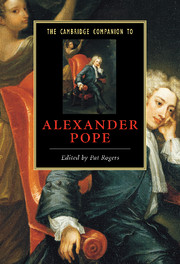Book contents
- Frontmatter
- Introduction
- 1 Pope, self, and world
- 2 Pope’s friends and enemies: fighting with shadows
- 3 Pope’s versification and voice
- 4 Poetic spaces
- 5 Pope’s Homer and his poetic career
- 6 Pope and the classics
- 7 Pope and the Elizabethans
- 8 Pope in Arcadia: pastoral and its dissolution
- 9 Pope and ideology
- 10 Pope and the poetry of opposition
- 11 Crime and punishment
- 12 Landscapes and estates
- 13 Money
- 14 Pope and the book trade
- 15 Pope and gender
- 16 Medicine and the body
- 17 Pope and the other
- Further reading
- Index
8 - Pope in Arcadia: pastoral and its dissolution
Published online by Cambridge University Press: 28 April 2008
- Frontmatter
- Introduction
- 1 Pope, self, and world
- 2 Pope’s friends and enemies: fighting with shadows
- 3 Pope’s versification and voice
- 4 Poetic spaces
- 5 Pope’s Homer and his poetic career
- 6 Pope and the classics
- 7 Pope and the Elizabethans
- 8 Pope in Arcadia: pastoral and its dissolution
- 9 Pope and ideology
- 10 Pope and the poetry of opposition
- 11 Crime and punishment
- 12 Landscapes and estates
- 13 Money
- 14 Pope and the book trade
- 15 Pope and gender
- 16 Medicine and the body
- 17 Pope and the other
- Further reading
- Index
Summary
During much of the nineteenth century, readers viewed Pope as an incorrigibly “social” poet, the laureate of tea cups and trivial gossip. For a critic of the Romantic age, William Lisle Bowles, he ranked no higher than “the painter of external circumstances in artificial life; as Cowper paints a morning walk, and Pope a game of cards!” Today we see him as one who exposed the crass commercialism of the age, who anatomized political corruption by depicting figures of vice like the reptilian Sporus in the Epistle to Arbuthnot, and who gave us an early vision of a squalid Nighttown in The Dunciad. To the Victorians, the primarily urban focus of Pope's later works seemed an evasion of the poet's true duty, while to modern readers it appears a badge of his modernity. What neither position fully allows for is the depth of Pope's involvement in the natural world, a direct outcome of his boyhood and youth spent in the Berkshire countryside.
In this essay I shall try, first, to describe the literary and biographic elements which helped to form the “pastoral” basis of his early works. Only if we appreciate what was going on in the years he spent “in Fancy's Maze” can we understand the nature of his later achievement once he “stoop'd to Truth, and moraliz'd his song” (TE, iv, p. 120). The account Pope gave in his Epistle to Arbuthnot drips with irony:
Soft were my Numbers, who could take offence, While pure Description held the place of Sense? Like gentle Fanny’s was my flow’ry Theme, A painted Mistress, or a purling Stream.
(147–50; TE, iv, pp. 106–7)- Type
- Chapter
- Information
- The Cambridge Companion to Alexander Pope , pp. 105 - 117Publisher: Cambridge University PressPrint publication year: 2007
- 3
- Cited by

